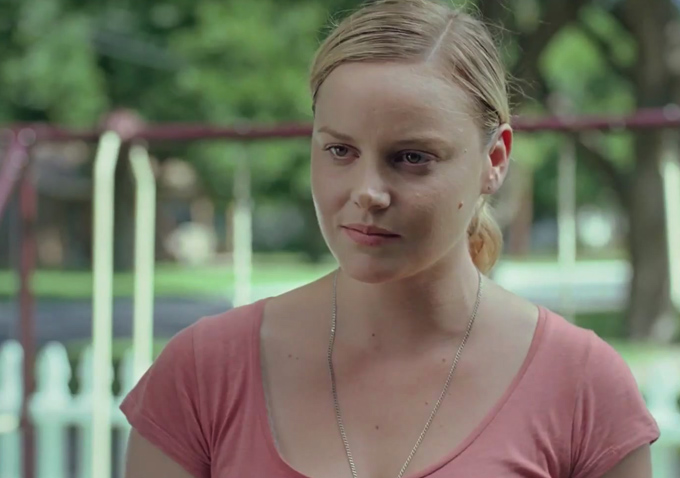
Well-told, well-shot and featuring a strong, but restrained and internalized performance from actress Abbie Cornish, director David Riker's "The Girl" is a mannered and in-the-pocket indie drama that might be a total subdued winner if it weren't for its dubious political ideologies, an irony considering the film's DNA is clearly built on humanist tendencies. While the Australian Cornish does have mild issues with sticking the landing on her Texas accent, it's her meatiest role since the deeply underrated "Bright Star" and lesser-seen, but no less valuable indies like "Somersault" and "Candy" (the latter featuring her going toe-to-toe with Heath Ledger and giving as good as she got) and she makes the most of it.
She leads the pic as the emotionally distraught and financially destitute Ashley (played quietly with an internal smoldering), and as the narrative unfolds through the mundane, we learn that her introverted angst and suffering stems from having lost custody of her son Georgie (Riker wisely almost always using clever show-don't-tell narrative devices to further the story). Trying to win him back, Ashley begins to grow desperate when she loses her local Austin megastore grocery job and her options start to run out. Exacerbating issues is a surprise visit from Ashley's estranged and wayward truck driving father Tommy (played by an always dependable Will Patton). While her monetary issues and an upcoming custody court date are a worrisome thorn, at the behest of her persuasive dad Ashley begrudgingly agrees to take a trip just south of the border where he lives in Mexico. Yet what is supposed to be a celebratory outing (Tommy has come into some money) gives Ashley some ill-conceived ideas. Tommy, she learns, is making $500 a head by taking illegal aliens across the border into the United States. Growing increasingly despondent about what to do about her son (Child Services making unexpected visits to her trailer don't help) and deeply in need of money on the eve of this court date, Ashley eventually concocts her own ill-advised attempt to bring illegals across.

The poorly thought out plan is a harrowing experience and results in a tragedy, which leaves Ashley having to look after Rosa, a young Mexican girl (Maritza Santiago Hernandez), and this is where the story truly begins. What transpires is a journey through Mexico to find Rosa's relatives and what follows are the difficult, but unforeseen rewards of friendship and bonding between the two females. However, the picture seems far more concerned with Ashley's redemption as a bad mother, confronting her alcoholic past (the reason she lost her son), having her accept her own faults and looking towards a brighter future all at the cost of this young Mexican girl who may have helped her become a better person along the way, but is now orphaned for her troubles. It is Ashley's story after all, but one can't help notice this poor young girl is just a cipher in the narrative to affect positive change in its heroine and this is disquieting.
An Independent Spirit and Gotham Award winnner for his neo-realist film "La Ciudad," Riker's lens is largely thoughtful and considered and he employs that same sense of tasteful choices, for instance, not falling into the temptation to use dialogue when none is needed and intelligently cutting sequences early where information need not be repeated. Musically, the score by Jacobo Lieberman and Leonardo Heiblum is used sparingly and its only in key sequences when it begins to swell. By and large, "The Girl" is an unsentimental portrait of class, immigration and tragic consequences and is better off by being so.
However, these already troubling ethical and political issues seem to spill over in the film's last act in favor of Ashley's story. Children's social services are demonized by simply trying to do their job — who is this American girl with a motherless Mexican child after all? — and the final sequences raises several disturbing issues and questions.
For one, the largely sober and realistic picture veers dangerously close to treacly manipulation in its final moments, which feels like a disappointing concession after many genuinely doleful and affecting sequences prior. And its final hopeful minutes betray the fact that Ashley — who we are now to presume is finally ready to be a fit mother to her own child — has essentially ruined Rosa's life with her egregious irresponsibility and selfish decisions. If there's a moral lesson to be learned in the conclusion of "The Girl," it remains vague and unclear if the true consequences of her act have sunk in; a vague final semi-smile on her face alluding to a happy ending is disturbing when in fact, for Rosa, there's none to be found. Even more disconcerting is the hard-to-read Ashley who seems more stressed than guilty throughout most of the picture. Yes, she's selfish and becomes less so as the narrative builds, but it's hard to tell where the contrite feelings begin and the sense of duty ends.
Are we to empathize with Ashley for seemingly getting her life on track at the expense of this little girl? Are we to value that family less because they're not white and now off-screen as Ashley drives back to the U.S.? While "The Girl" doesn't necessarily suggest these sentiments, its unsatisfying ending doesn't refute these ideas either. Anyone who finds this conclusion a humanistic or socially reprehensible dealbreaker can hardly be faulted. Before these questionable issues come to a head and then falter in the finale, there is a lot of value in "The Girl." It's a thoughtful and well-intentioned picture that can be objective and also quietly heartbreaking. But the unsettling fact remains, in the end Ashley drives home with the intention of reclaiming her son while Rosa's situation is left behind. Rosa's grandma, who will now take care of the young girl, may have let Ashley off the moral hook ("the river took my daughter, not you"), but we the audience, are not so convinced. [B-]





